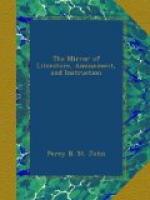Father and son now made the tour of Italy, and met in every city with an enthusiastic reception.
In Rome, Mozart gave a miraculous attestation of his quickness of ear, and extensive memory, by bringing away from the Sistine Chapel the “Miserere of Allegri,” a work full of imitation and repercussion, mostly for a double choir, and continually changing in the combination and relation of the parts. This accomplished piece of thievery was thus performed:—the sketch was drawn out upon the first hearing, and filled up from recollection at home—Mozart then repaired to the second and last performance, with his manuscript in his hat, and corrected it.
The slow voluptuous movement of the style of dancing prevalent in Italy gave Mozart great pleasure; in the postscripts to his father’s letters, which he generally addressed to his sister and playfellow, he speaks of this subject with as much zest as of his own art. Later in manhood he became a pupil of Vestris, and the gracefulness of his dancing was much admired, especially in the minuet.
About this time Mozart’s voice began to break, and he ceased to sing in public, unless words were put before him; the violin he continued to play, but mostly in private. The alarming illnesses which had attacked his children on their journey kept Leopold Mozart in continual anxiety—the malaria of Rome and the heat of Naples were alike dreaded by him.
The travellers arrived at Naples in May, and fortunately procured cool and healthy lodgings. Here they visited the English Ambassador, Sir William Hamilton, whose acquaintance they had made in London, and whose lady was not only a very agreeable person, but a charming performer on the harpsichord. She trembled on playing before Mozart. The concerts given by the Mozarts in Naples were very successful, and they were treated with great distinction; the carriages of the nobility, attended by footmen with flambeaux, fetched them from home and carried them back; the queen greeted them daily on the promenade, and they received invitations to the ball given by the French Ambassador on the marriage of the Dauphin.




